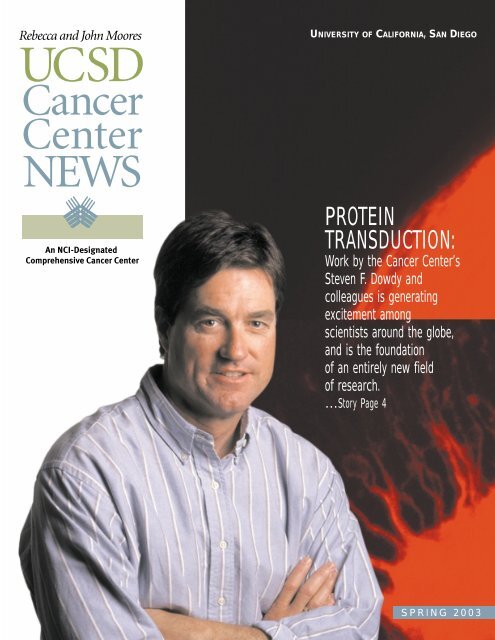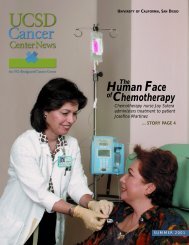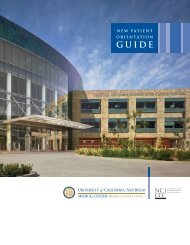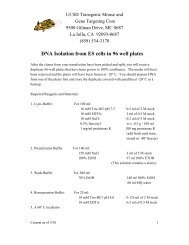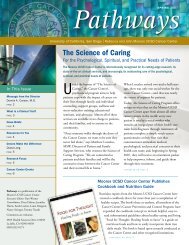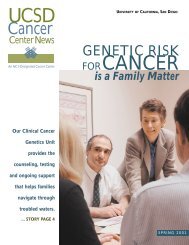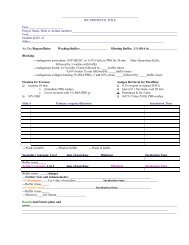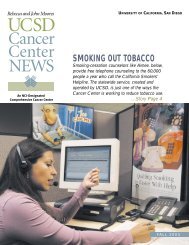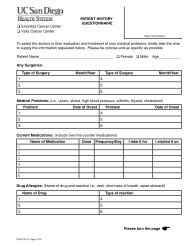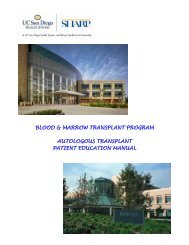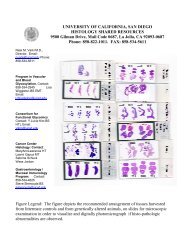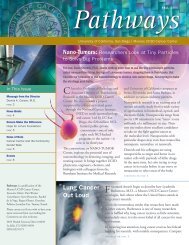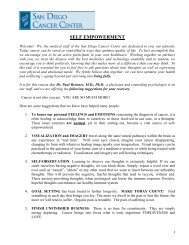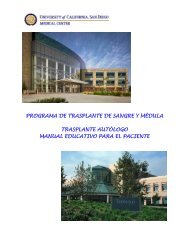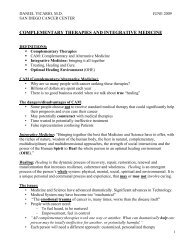PROTEIN TRANSDUCTION: - Moores Cancer Center
PROTEIN TRANSDUCTION: - Moores Cancer Center
PROTEIN TRANSDUCTION: - Moores Cancer Center
Create successful ePaper yourself
Turn your PDF publications into a flip-book with our unique Google optimized e-Paper software.
UNIVERSITY OF CALIFORNIA, SAN DIEGO<br />
<strong>PROTEIN</strong><br />
<strong>TRANSDUCTION</strong>:<br />
Work by the <strong>Cancer</strong> <strong>Center</strong>’s<br />
Steven F. Dowdy and<br />
colleagues is generating<br />
excitement among<br />
scientists around the globe,<br />
and is the foundation<br />
of an entirely new field<br />
of research.<br />
…Story Page 4<br />
SPRING 2003
UCSD <strong>Cancer</strong> <strong>Center</strong> Foundation<br />
PRESIDENT OF THE FOUNDATION BOARD<br />
Cinda K. Lucas *<br />
OFFICERS<br />
Gordon P. Boerner *<br />
Marilynn Boesky *<br />
Howard I. Cohen *<br />
William T. Comer, Ph.D. *<br />
Frank M. Goldberg *<br />
Charles F. Gorder Sr., Esq. *<br />
Mary Rand Taylor *<br />
John McDonnell *<br />
BOARD OF DIRECTORS<br />
J. Samuel Armstrong, IV<br />
Terry Ash<br />
Kathryn A. Bernert, Esq.<br />
Howard C. Birndorf<br />
Sophie Brody<br />
Deborah J. Case<br />
Carol L. Chang<br />
Jay de Groot<br />
Charles Faith<br />
Yehudi Gaffen<br />
Howard Goldfeder*<br />
Donald W.Grimm<br />
Andre R. Horn<br />
Ernest Huang, Ph.D.<br />
Al Hugo-Martinez<br />
Jacqueline Johnson, Ph.D.<br />
Maurice C. Kaplan, Esq. *<br />
Jerome S. Katzin, Esq. *<br />
Jeffrey Lipinsky<br />
George L. Liggins,<br />
M.P.H., Ph.D.<br />
Joany Mosher<br />
Henry L. Nordhoff<br />
Carrie O’Brien<br />
Anne S. Otterson<br />
John W. Otterson, II<br />
Cynthia Polak<br />
Kenneth D. Polin, Esq.<br />
ADVISORY BOARD<br />
John R. Bonn, Esq.<br />
Diane Clarke<br />
Lois J. Crandell<br />
Audrey S. Geisel<br />
George L. Gildred<br />
Irwin Jacobs, Ph.D.<br />
Richard Levi<br />
Art Lujan<br />
Marianne McDonald, Ph.D.<br />
John H. Moxley III, M.D.<br />
Peter Preuss<br />
Clayton D. Pruett<br />
Ruth L. Schulman<br />
John Walton<br />
Walter Zable<br />
EX OFFICIO MEMBERS<br />
Robert C. Dynes, Ph.D.<br />
Edward W. Holmes, M.D.<br />
Robert Horsman<br />
Katherine Kennedy<br />
Sam Iacobellis, Ph.D.<br />
Esther R. Nahama<br />
Tom Nielsen<br />
Rebecca Newman<br />
INTERIM DIRECTOR, MOORES<br />
UCSD CANCER CENTER<br />
Gordon Gill, M.D.<br />
DEPUTY DIRECTOR,<br />
CLINICAL OPERATIONS<br />
David W. Easter, M.D.<br />
DEPUTY DIRECTOR,<br />
RESEARCH OPERATIONS<br />
Thomas J. Kipps, M.D., Ph.D.<br />
ASSOCIATE DIRECTOR FOR<br />
ADMINISTRATION<br />
Ira S. Goodman<br />
DIRECTOR OF DEVELOPMENT<br />
Sarah Godfrey<br />
ASSISTANT DIRECTOR OF<br />
DEVELOPMENT<br />
Cheryl D. Coate<br />
DEVELOPMENT ASSISTANTS<br />
Christa Collins<br />
Maryann Lapthorn<br />
Jennifer Mann<br />
* Officers and Members of the Executive Committee<br />
<strong>Moores</strong> UCSD <strong>Cancer</strong> <strong>Center</strong> News is a publication of the<br />
UCSD <strong>Cancer</strong> <strong>Center</strong> Foundation. Comments are welcome.<br />
UCSD <strong>Cancer</strong> <strong>Center</strong> Foundation<br />
9500 Gilman Drive MC 0658<br />
La Jolla, CA 92093-0658<br />
(858) 822-0022<br />
Executive Editor: Sarah Godfrey • Editor: Nancy Stringer<br />
Contributing Writers: Cheryl D. Coate, Sarah Godfrey, Nancy<br />
Stringer • Cover Photo: Dave Siccardi • Design: Janice Gordon<br />
Message<br />
from the<br />
Director<br />
As many of you may know,<br />
at the end of last year Dr. David<br />
Tarin stepped down as director of<br />
the <strong>Cancer</strong> <strong>Center</strong> to return full<br />
time to his research, teaching and<br />
clinical activities at UCSD. At that<br />
time, I was named as the interim<br />
director to maintain the <strong>Center</strong>’s<br />
forward momentum, and to continue its operations in a seamless<br />
fashion while the university conducts an international search for<br />
Dr. Tarin’s successor.<br />
It is an honor to serve as interim director of the <strong>Cancer</strong><br />
<strong>Center</strong>, an organization I’ve been a part of since its founding<br />
in 1979.<br />
My UCSD roots go back even further. I’ve been a member<br />
of the UCSD faculty since 1969 when the School of Medicine<br />
was in its infancy. In those early days, there were no buildings<br />
on our medical school campus! We rented space at the Salk<br />
Institute, where we conducted research and went about the<br />
business of organizing the curriculum and planning the facilities<br />
for a brand new school.<br />
That was an extraordinarily exciting time and, in many ways,<br />
is similar to the excitement and energy all of us who are involved<br />
in cancer feel with the new <strong>Cancer</strong> <strong>Center</strong> facility coming to life.<br />
As the building takes shape, it acts as a catalyst to focus our<br />
efforts on major decisions that will impact the future of the<br />
<strong>Center</strong>.<br />
One of the most important decisions is the recruitment of a<br />
permanent director, and there is good news on this front. UCSD<br />
has assembled a stellar search committee that is actively interviewing<br />
candidates, all of whom are nationally prominent figures<br />
in the cancer field. We are pleased both with the number of candidates<br />
who have expressed interest in coming here, and with the<br />
quality of the candidates. As you might imagine, the recruitment<br />
process for such an important position is lengthy, but we hope to<br />
be able to announce a new director later this year.<br />
In the interim, the leadership and members of the <strong>Cancer</strong><br />
<strong>Center</strong> are engaged in an internal evaluation process, looking<br />
at our current strengths and identifying areas to expand and<br />
enhance. Out of this process will emerge our strategic goals —<br />
an important aspect of our transition to the new <strong>Cancer</strong> <strong>Center</strong><br />
building, scheduled to open in Fall 2004.<br />
Another area of activity as we plan for occupancy of the new<br />
facility is that of continuing to build and strengthen our clinical<br />
programs and our clinical research. In line with that, in this issue<br />
<strong>Cancer</strong> <strong>Center</strong> News<br />
2
of the newsletter, on page 9, we<br />
introduce three new members<br />
of our <strong>Cancer</strong> <strong>Center</strong> family —<br />
clinical counselor Cynthia Sava,<br />
medical oncologist Lakshmi<br />
Vemuri, and cancer pharmacist<br />
Susan Wilson.<br />
In future issues we will bring<br />
you news of additional recruitments<br />
of clinicians with expertise<br />
in clinical research, particularly<br />
of innovative therapies. We are<br />
continuing to actively recruit to<br />
enhance our ability to translate<br />
new discoveries into more<br />
effective therapies.<br />
To better understand the<br />
importance of clinical research<br />
in our ongoing efforts to<br />
improve care for patients, I hope<br />
you will read the feature article<br />
about cancer vaccines on page 6.<br />
This article showcases exciting<br />
clinical research under way now<br />
at the <strong>Cancer</strong> <strong>Center</strong> that may<br />
lead to improved care for lymphoma<br />
patients.<br />
Clinical research and, ultimately,<br />
new standards of clinical<br />
care are founded upon basic<br />
science discoveries. Our cover<br />
story focuses on an intriguing<br />
new field of basic research called<br />
protein transduction, which is<br />
generating excitement among<br />
scientists around the world and<br />
holds tremendous promise<br />
for a broad range of clinical<br />
applications.<br />
We hope you enjoy learning<br />
about new developments at the<br />
<strong>Cancer</strong> <strong>Center</strong> as much as we<br />
enjoy sharing them with you.<br />
Sincerely,<br />
Gordon Gill, M.D.<br />
Interim Director,<br />
<strong>Moores</strong> UCSD <strong>Cancer</strong> <strong>Center</strong><br />
Introducing…Gordon Gill, M.D.<br />
Adistinguished physicianresearcher,<br />
Dr. Gordon Gill has<br />
been a member of the UCSD<br />
faculty for 34 years. During his tenure<br />
at UCSD, he has served as chief of the<br />
Division of Endocrinology and<br />
Metabolism in the Department of<br />
Medicine (1971-95) and was associate<br />
chair for scientific affairs in the<br />
Department of Medicine (1992-95).<br />
Most recently he served as Dean for<br />
Scientific Affairs for the School of<br />
Medicine.<br />
He received his undergraduate<br />
and medical degrees from Vanderbilt<br />
University. After serving a residency<br />
and a National Institutes of Health<br />
post-doctoral fellowship at Yale-New<br />
Haven Hospital, he joined the UCSD<br />
faculty during the first year it taught<br />
medical students.<br />
IN THIS ISSUE<br />
4 Cover Story:<br />
Protein Transduction<br />
6 <strong>Cancer</strong> Vaccines<br />
7 Know Your<br />
Breast <strong>Cancer</strong> Risk<br />
8 Construction Update<br />
9 New Clinical Staff<br />
10 Development News<br />
12 The Last Word<br />
Dr. Gill has served on numerous<br />
scientific boards and the editorial<br />
boards of many professional journals.<br />
Since 1995 he has been an associate<br />
editor of Cecil’s Textbook of<br />
Medicine. He is also a fellow of the<br />
American Academy of Arts and<br />
Sciences, and is a recipient of<br />
Research Career Development and<br />
MERIT awards from the NIH.<br />
His research has often focused<br />
on molecular abnormalities leading<br />
to malignant transformation, and<br />
his clinical practice in internal<br />
medicine and endocrinology has<br />
included a special interest in thyroid<br />
cancer and endocrine tumors. He<br />
holds a research grant from the NIH<br />
that is in its 36th year of continual<br />
funding, a rare accomplishment<br />
among scientists.<br />
ON THE COVER: The two cells, shown in red, illustrate the power<br />
of protein transduction to change the biology of human cells. In the laboratory, two types<br />
of the same protein, known to alter membrane architecture, were delivered into the cell<br />
membranes. In the top panel, the protein contained an inactivating mutation and the cell<br />
surface remained smooth. In the bottom panel, using a version containing an activating<br />
mutation, spikes appeared within 10 minutes in more than 95 percent of the cells.<br />
3<br />
<strong>Cancer</strong> <strong>Center</strong> News
SPECIAL DELIVERY:<br />
Supersize Cargoes<br />
Pack<br />
Big<br />
Molecular<br />
V<br />
Punch<br />
irtually all drugs that carry out their healing<br />
mission inside of cells are comprised of small<br />
molecules. Not because small molecules<br />
make the best drugs, but because the cell only<br />
allows small molecules to penetrate the pores of its<br />
protective cell membrane.<br />
Now a team of <strong>Cancer</strong><br />
<strong>Center</strong> researchers led by<br />
Steven F. Dowdy, Ph.D.,<br />
is rewriting the laws of<br />
pharmacology with the<br />
development of a method<br />
to slip large, informationrich<br />
molecules such as<br />
enzymes and proteins<br />
past the cell’s membrane.<br />
The team’s technique<br />
for inserting molecules<br />
hundreds of times larger<br />
than previously thought<br />
possible is called protein<br />
transduction. It is the<br />
foundation of an entirely<br />
new field of study that<br />
in the last four years has<br />
exploded, with more than<br />
1,000 laboratories around<br />
the globe now conducting<br />
research based upon Dowdy’s method.<br />
He and colleagues wrote two landmark papers in<br />
1999 proving the principle that you could ferry large<br />
molecules through the cellular membrane and have<br />
Steven Dowdy (center) reviews lab images with graduate students (l-r)<br />
Eric Snyder, Courtney Havens and Bryan Meade. Above right: A mouse<br />
model of human ovarian cancer provides a dramatic illustration of<br />
protein transduction. Fifteen minutes after injection of a peptide<br />
(green), most cells in the abdominal cavity, where ovarian cancer<br />
cells have invaded, have taken up the peptide.<br />
them intact and functioning<br />
inside the cell. This is done<br />
by chemically snipping out<br />
a particular segment of a protein.<br />
The segment, called a<br />
protein transduction domain<br />
(PTD), is positively charged.<br />
The surface of the cell, any<br />
cell, is negatively charged.<br />
When the PTD comes in<br />
contact with the cell membrane,<br />
the two interact in a<br />
powerful fashion, tethering<br />
securely the PTD and its<br />
large-molecule cargo.<br />
“Then,” said Dowdy, a<br />
43-year-old molecular oncologist,<br />
“the magic happens —<br />
that hulking cargo crosses the<br />
cell membrane. We don’t yet<br />
understand exactly how that<br />
happens.”<br />
But why is this generating so much excitement among<br />
scientists Is it simply interesting molecular acrobatics<br />
Far from it, according to Dowdy, who is also an investigator<br />
of the Howard Hughes Medical Institute’s group<br />
<strong>Cancer</strong> <strong>Center</strong> News<br />
4
“<br />
at UCSD. The larger molecules<br />
contain much more information<br />
— instructions that could be the<br />
basis for new drugs that would be<br />
more specific in their function,<br />
meaning they would work at smaller<br />
doses and have fewer side effects.<br />
“I like to use the analogy of a<br />
house with a mail slot,” says Dowdy.<br />
“The small molecule is the equivalent<br />
of a single-page letter. It can<br />
go in easily, but contains limited<br />
information. In contrast, with<br />
protein transduction we can put<br />
a computer through the same mail<br />
slot, have it reassembled on the<br />
other side, and get vastly more<br />
information inside the house,<br />
or cell, than ever before.”<br />
Based on his work to date,<br />
and the work now of many others,<br />
it appears that virtually every<br />
chemical structure can utilize this<br />
approach — nucleic acids, proteins,<br />
peptides, synthetic molecules,<br />
carbohydrates and more.<br />
“So now, in theory, scientists<br />
could redesign the existing smallmolecule<br />
drug libraries to these<br />
larger size molecules and add much<br />
more specific information,” he said.<br />
“This could represent an entirely<br />
new approach to treating disease;<br />
not only cancer, but others ranging<br />
from heart disease to headaches<br />
and the common cold.”<br />
Dowdy acknowledges that the<br />
field has not yet matured enough<br />
to know exactly how well this will<br />
work in practice. Nevertheless, the<br />
field is moving forward rapidly and<br />
the preclinical work in animals<br />
looks very promising.<br />
His own laboratory is focusing<br />
on using protein transduction for<br />
cancer. He and his colleagues have<br />
Protein transduction is like putting a<br />
computer through a mail slot. We can<br />
get vastly more information inside the<br />
cell than ever before.<br />
— Steven Dowdy, Ph.D.<br />
”<br />
been working to introduce tumor<br />
suppressor proteins, such as the<br />
p53 protein, into mice whose cells<br />
have lost this function. They are<br />
working with two mouse models<br />
of cancer. One type develops<br />
peritoneal malignancies, such as<br />
ovarian or pancreatic cancer, and<br />
the other develops lymphoma.<br />
“About 50 percent of the mice<br />
we’ve treated, all with aggressive<br />
and terminal disease, have<br />
achieved long-term survival,”<br />
Dowdy said of the work that has<br />
not yet been published. “However,<br />
doing this in a mouse is a long<br />
way from doing it in a human.<br />
Still, we’ve shown that we can<br />
reconstitute tumor suppressor<br />
function and stop the cancerous<br />
process in models that closely<br />
mimic human disease.”<br />
If his results continue to hold<br />
up over time, the next step would<br />
be to move this work into clinical<br />
trials, which Dowdy says is still<br />
several years away.<br />
Dowdy’s laboratory is also<br />
looking to develop new molecules<br />
that could be tailored to the job at<br />
hand. By attaching multiple cargo<br />
domains to the PTD, like cars to<br />
a train, he hopes to build highly<br />
selective, composite molecules.<br />
An example of the potential<br />
utility of this approach is found<br />
in doxyrubicin, a widely used anticancer<br />
drug.<br />
“Doxyrubicin is a great drug, but<br />
it is susceptible to a protein called<br />
p-glycoprotein, which acts like a<br />
pump in the cancer cell to push the<br />
drug out. This problem is often<br />
worse in late-stage and recurrent<br />
disease,” said Dowdy. “With our<br />
transducible approach, we could,<br />
theoretically, add modules that<br />
would enable us to selectively<br />
bypass the p-glycoprotein and<br />
deliver the drug directly to the<br />
nucleus in tumor cells and not the<br />
normal cells.”<br />
Dowdy also said it would be possible<br />
to add an imaging compound<br />
to a drug warhead and “simultaneously<br />
image the death of the<br />
tumor, which would give us an idea<br />
of how well the drug is working.”<br />
By adding these layers of selectivity,<br />
the theory goes, one can get<br />
further and further discriminations<br />
to hit the bull’s eye of the tumor<br />
while sparing the surrounding normal<br />
cells.<br />
“This is the ultimate goal,” he<br />
said. “It may be optimistic at this<br />
point, but I believe some form of<br />
this modular approach will be able<br />
to move forward and will give us<br />
the kind of selectivity and versatility<br />
that small molecules simply are not<br />
capable of providing.”<br />
—Nancy Stringer, Director,<br />
<strong>Cancer</strong> <strong>Center</strong> Communications<br />
5<br />
<strong>Cancer</strong> <strong>Center</strong> News
VACCINES<br />
TAKE A SHOT<br />
AT CANCER<br />
ONE OF THE MAJOR ACCOMPLISHMENTS<br />
OF THE LAST HALF-CENTURY has been<br />
the development of vaccines to prevent such<br />
diseases as polio, measles, diphtheria and influenza.<br />
But now scientists at the <strong>Moores</strong> UCSD <strong>Cancer</strong> <strong>Center</strong><br />
and other major institutions across the nation and<br />
around the world are working on vaccines for cancer.<br />
Unlike their predecessors, which<br />
prevent illness, cancer vaccines are<br />
designed to prevent a recurrence in<br />
those who already have the disease.<br />
These therapeutic vaccines work by<br />
teaching the patient’s own immune<br />
system to recognize and eradicate<br />
cancer cells.<br />
Researchers at the <strong>Cancer</strong> <strong>Center</strong><br />
are conducting two clinical trials now<br />
to test the effectiveness of a patientspecific,<br />
or customized, vaccine<br />
against non-Hodgkin’s lymphoma<br />
(NHL).<br />
The vaccine is made from a protein<br />
found on the surface of lymphoma<br />
cells taken from the patient’s lymph<br />
nodes. This protein, called an idiotype<br />
(Id), is unique to the lymphoma cells<br />
of a particular patient. The Id is then<br />
mixed in the laboratory with a substance<br />
called keyhole limpet hemocyanin<br />
(KLH), which is derived from<br />
sea snails. The body recognizes KLH<br />
as an invader and launches an<br />
immune response.<br />
“When the Id-KLH cocktail is<br />
injected, the immune system not only<br />
attacks the KLH but also recognizes<br />
its own cancerous cells and destroys<br />
them as well,” said the <strong>Cancer</strong> <strong>Center</strong>’s<br />
Peter Holman, M.D., assistant professor<br />
of medicine and principal investigator<br />
of the two clinical trials.<br />
In one study, the vaccine is injected<br />
following an autologous stem cell<br />
transplant. In this type of transplant,<br />
the patient’s stem cells are removed<br />
before high-dose chemotherapy is<br />
administered, and then given back<br />
afterward to replenish the body’s<br />
supply of blood cells.<br />
So far four participants have<br />
completed this protocol at UCSD<br />
and three have mounted an immune<br />
response. The first patient on the<br />
study received his final vaccination<br />
in May 2002 and remains in remission<br />
with no further treatment (see<br />
sidebar).<br />
“While it is early in the process,<br />
the strength of the immune response<br />
results gives us hope that we may<br />
see prolonged remissions,” said<br />
Dr. Holman.<br />
To be eligible for the study, patients<br />
Peter Holman, M.D.<br />
must be diagnosed with<br />
low-grade or mantle cell non-<br />
Hodgkin’s lymphoma (NHL).<br />
Also eligible are patients whose<br />
low-grade NHL has transformed<br />
to high-grade NHL.<br />
This study is designed to test<br />
whether or not post-transplant<br />
patients would develop an<br />
immune response to the<br />
vaccine, and, if so, would this keep<br />
patients in remission longer than<br />
would be expected following a transplant<br />
alone.<br />
Dr. Holman is also conducting a<br />
non-transplant clinical trial in which<br />
patients receive the monoclonal antibody<br />
Rituxan before receiving the<br />
vaccine regimen.<br />
Non-Hodgkin’s lymphoma is one<br />
of three cancers that have been<br />
increasing in incidence over the past<br />
20 years; the others are lung cancer<br />
in women, and melanoma. There has<br />
been an 81 percent increase in NHL<br />
overall since 1973. The reasons for<br />
this increase are not well understood,<br />
although environmental agents have<br />
been implicated, along with hepatitis<br />
C and HIV. There were 54,000 new<br />
cases of NHL in the U.S. in 2002,<br />
representing 4 percent of all cancers.<br />
For further information about these<br />
and other cancer clinical trials available<br />
at UCSD, please call the <strong>Cancer</strong><br />
<strong>Center</strong>’s Clinical Trials Office,<br />
858-657-7020, or visit the <strong>Center</strong>’s<br />
website: www.cancer.ucsd.edu.<br />
<strong>Cancer</strong> <strong>Center</strong> News<br />
6
Jerry Hermesch:<br />
REGAINING<br />
HIS FUTURE<br />
For the last eight years, since<br />
being diagnosed with Stage IV<br />
non-Hodgkin’s lymphoma,<br />
Galen “Jerry” Hermesch has been<br />
living one day at a time. Before<br />
enrolling in a therapeutic vaccine<br />
study at UCSD, he had gone<br />
through numerous treatment<br />
approaches and had relapsed<br />
three times.<br />
The 56 year old from Rancho<br />
Mirage is hoping that the third<br />
time will prove to be the charm.<br />
“Until now, my longest time<br />
in remission was eight months,”<br />
Hermesch said. “It’s been 19<br />
months since my autologous stem<br />
cell transplant, and almost a year<br />
since my last vaccination and<br />
there are no indications of any<br />
recurrence.”<br />
While Hermesch knows that<br />
the vaccine is experimental and<br />
that he may have a recurrence of<br />
his disease, he is for the first time<br />
in nearly a decade thinking about<br />
the future.<br />
“Without this treatment, I know<br />
the disease would have been a continuing<br />
issue until it took my life,”<br />
he said. “While there’s no way to<br />
say for certain that it’s the ultimate<br />
answer, it offers the most positive<br />
thing that I have experienced in the<br />
last eight years. All of a sudden, it<br />
seems, I have a future again.”<br />
Calculating Your<br />
BREAST CANCER RISK<br />
A<br />
new Web site, www.breastcancerprevention.com,<br />
offers women a simple tool to estimate their individual<br />
breast cancer risk and<br />
provides information about the<br />
STAR study, a clinical trial to<br />
prevent the disease.<br />
The Web site is sponsored by the<br />
National Surgical Adjuvant Breast and<br />
Bowel Project (NSABP), a non-profit<br />
cancer research group<br />
funded by the National<br />
<strong>Cancer</strong> Institute (NCI).<br />
Researchers from the<br />
NCI and the NSABP have<br />
developed a computerized<br />
formula, known as the<br />
Gail model, that allows<br />
a woman to estimate her<br />
risk of developing breast<br />
cancer in the next five<br />
years and in her lifetime.<br />
The model uses factors such as age, family history of breast cancer, and<br />
other personal factors to determine these estimates. Most importantly,<br />
the Gail model has been scientifically analyzed and found to be reliable.<br />
“In my practice, I find that women tend to overestimate their breast<br />
cancer risk leading to increased anxiety about developing the disease,”<br />
said Anne Wallace, M.D., director of the <strong>Cancer</strong> <strong>Center</strong>’s Breast Care<br />
Unit. “Information my patients get about their individual breast cancer<br />
risk from the Web site allows me to have a personal conversation with<br />
them and to map a strategy for good breast care.”<br />
A decade ago, women at increased risk for breast cancer had no option<br />
other than vigilant screening designed to detect the disease in its earliest<br />
stage. That no longer is the case. In 1998, research showed that tamoxifen<br />
— a drug used for over 20 years to treat breast cancer — could prevent the<br />
disease from occurring in almost half the women at increased risk for it.<br />
Armed with this finding, the NSABP and the NCI began a follow-up<br />
study, called STAR (Study of Tamoxifen and Raloxifene), to compare the<br />
proven benefits of tamoxifen to the promising effects of raloxifene, an<br />
osteoporosis drug that has shown potential for reducing a woman’s risk<br />
of breast cancer. STAR participants take either tamoxifen or raloxifene<br />
daily for five years and receive close follow-up examinations. The drugs<br />
are provided at no cost to study participants.<br />
Postmenopausal women at increased risk for breast cancer can call<br />
858-657-7083 for more information about STAR.<br />
7<br />
<strong>Cancer</strong> <strong>Center</strong> News
Bird’s Eye View<br />
Construction on the new <strong>Cancer</strong> <strong>Center</strong><br />
facility is well under way, with completion<br />
scheduled for late 2004. This picture, taken<br />
from atop a large construction crane and<br />
oriented to the northwest, shows a portion<br />
of the concrete shell of the <strong>Cancer</strong> <strong>Center</strong>’s<br />
lower level. The crane is positioned near<br />
what will eventually be a 5-story research<br />
tower. The structural steel marks the northwest<br />
side of what will be a 3-story tower to<br />
house clinical space, the infusion center,<br />
women’s center, pharmacy and more. To<br />
the left of the structural steel will be the<br />
gardens outside the infusion center and the<br />
meadow area that will separate the <strong>Cancer</strong><br />
<strong>Center</strong> from Thornton Hospital and the<br />
Perlman Ambulatory Care <strong>Center</strong>. Their<br />
parking lots are visible in the picture’s<br />
top-left corner. The building in the top-right<br />
corner is an addition under construction at<br />
UCSD’s Shiley Eye <strong>Center</strong> that will house<br />
its new glaucoma and retina centers.<br />
New Director<br />
of Development<br />
Meet Sarah Godfrey, the new<br />
Director of Development for<br />
the UCSD <strong>Cancer</strong> <strong>Center</strong><br />
Foundation.<br />
Sarah brings many years of<br />
fundraising and administrative<br />
experience to this position. She<br />
has spent the major and most<br />
recent part of her career at UCLA,<br />
serving first as a major gifts<br />
officer for the School of Medicine<br />
Sarah Godfrey<br />
and subsequently as the founding<br />
Administrative Director of the Rhonda Fleming<br />
Mann Resource <strong>Center</strong> for Women with <strong>Cancer</strong>.<br />
Prior to her years at UCLA, Sarah honed her<br />
skills in foundation relations and planned gifts,<br />
serving as a program officer for the Pew Charitable<br />
Trust, as the director of development for the Agnes<br />
Irwin School in Pennsylvania, and as the director of<br />
foundation relations for the University of Florida.<br />
She did her undergraduate work at Vassar College<br />
and graduate work at Cornell University.<br />
“We’re truly fortunate to have Sarah’s collective<br />
skills, training and experience to lead the <strong>Cancer</strong><br />
<strong>Center</strong>’s development efforts as we enter a new<br />
and landmark phase in its history,” said Ira<br />
Goodman, the <strong>Cancer</strong> <strong>Center</strong>’s Associate Director<br />
for Administration.<br />
Sarah may be reached by phone at<br />
858-822-0070, or email: sgodfrey@ucsd.edu.<br />
Survivors Day Event<br />
Set for June 8<br />
National <strong>Cancer</strong> Survivors Day is slated for<br />
1 to 5 p.m. June 8 at Bloch <strong>Cancer</strong> Survivors<br />
Park at Spanish Landing (directly across<br />
Harbor Drive from the San Diego Airport.).<br />
The free public event is sponsored by <strong>Cancer</strong><br />
Survivorship: San Diego!, an umbrella organization<br />
comprised of cancer survivors, hospitals,<br />
cancer centers, researchers and support service<br />
organizations in San Diego County.<br />
This 6th annual community event celebrates<br />
progress in detecting and treating cancer, and<br />
offers a wealth of information to individuals and<br />
families with an interest in cancer-related issues.<br />
The event will feature a health fair with more<br />
than 30 exhibits, entertainment, dancing, food,<br />
and group activities. Lectures by medical experts<br />
on issues of interest to cancer survivors, their<br />
families, and the general public will be offered<br />
in English, Spanish and several Asian-Pacific<br />
Islander languages. There also will be opportunity<br />
for cancer patients to exchange information<br />
about their experiences and to talk with local<br />
health care providers.<br />
To register, please send your contact information<br />
(name, address, phone) to event coordinator<br />
Nicki Hobson by email (nohobson@aol.com),<br />
fax (760-598-7304) or mail (2070 Ridgeline<br />
Ave., Vista 92083).<br />
<strong>Cancer</strong> <strong>Center</strong> News<br />
8
CENTER EXPANDS<br />
CLINICAL STAFF<br />
As part of the <strong>Cancer</strong> <strong>Center</strong>’s planned enhancement of its clinical services, we are<br />
pleased to introduce three new members of our clinical staff.<br />
Cynthia Sava, M.S.W.<br />
A diagnosis of cancer can change<br />
the entire landscape of an individual’s<br />
environment, impacting family<br />
and close friends, and creating a<br />
new set of circumstances that can<br />
throw an otherwise normal life —<br />
marriage and relationships, career,<br />
finances – into a tailspin. Cynthia<br />
Sava, M.S.W., is a clinical counselor<br />
whose primary responsibility is to<br />
formulate, manage, and deliver<br />
psychosocial treatment plans for<br />
our cancer patients. Just as there<br />
are many kinds of cancer, each<br />
affecting an individual in its unique<br />
way, there are also many factors to<br />
consider in developing a treatment<br />
plan. Taking age and gender into<br />
account, Sava identifies a patient’s<br />
support network and assesses<br />
coping skills, education, spirituality,<br />
cultural beliefs, family roles, and<br />
socio-economic status that may<br />
hinder ability to access services.<br />
Other physical or mental health<br />
issues may further complicate matters.<br />
Sava is also developing several<br />
group programs that are specially<br />
designed for patient groups, and for<br />
patients and their family caregivers.<br />
Lakshmi Vemuri, M.D.<br />
Dr. Vemuri is a medical oncologist<br />
who recently joined the UCSD<br />
faculty as an Assistant Professor<br />
of Medicine in the Division of<br />
Hematology/Oncology. Prior to<br />
joining the faculty, she trained at<br />
UCSD as a hematology/oncology<br />
fellow. During that time she worked<br />
as a co-investigator with Asad<br />
Bashey, M.D., Ph.D., Assistant<br />
Professor of Medicine, on a national<br />
Phase III clinical trial involving a drug<br />
being tested as a treatment for<br />
chronic myelogenous leukemia.<br />
Based upon the results of this trial<br />
the investigational drug, now known<br />
as Gleevec, was approved by the<br />
FDA and today is widely available to<br />
cancer patients. Vemuri’s clinical and<br />
research interests include brain<br />
tumors, gastrointestinal cancers,<br />
breast cancer, and melanoma. She is<br />
currently working to develop clinical<br />
trials for patients with brain tumors<br />
and with gastrointestinal cancers.<br />
She sees patients in the Theodore<br />
Gildred Facility at UCSD Medical<br />
<strong>Center</strong> in Hillcrest, and at the Perlman<br />
Ambulatory Care <strong>Center</strong> adjacent to<br />
Thornton Hospital in La Jolla.<br />
Susan Wilson, Pharm.D.<br />
Susan A. Wilson, Pharm.D.,<br />
is coordinating the clinical and<br />
administrative aspects of our<br />
inpatient and outpatient pharmacy<br />
services, a new position in the<br />
<strong>Cancer</strong> <strong>Center</strong>. After obtaining her<br />
Doctor of Pharmacy degree from<br />
the University of Nebraska Medical<br />
<strong>Center</strong>, Susan spent four years as a<br />
staff pharmacist in their bone marrow<br />
transplantation program. She<br />
became a staff pharmacist for<br />
Thornton Hospital in 1993, and also<br />
worked closely with our Blood and<br />
Marrow Transplantation Program.<br />
Susan is responsible for managing<br />
the costs associated with our<br />
chemotherapy program. While developing<br />
procedures that streamline the<br />
administration of drugs to cancer<br />
patients, Susan keeps focused on<br />
the most important factor – safety.<br />
Directly relevant to this administrative<br />
responsibility, she is a member of a<br />
task force that is reviewing software<br />
programs to facilitate online drug<br />
reporting and ordering.<br />
9<br />
<strong>Cancer</strong> <strong>Center</strong> News
Aviara Events<br />
Help <strong>Cancer</strong> Research<br />
Aceremony was held at the Four<br />
Seasons Resort Aviara in Carlsbad<br />
to acknowledge the success of the<br />
2002 Terry Fox 5K Run/Walk and its sister<br />
event, the Terry Fox Golf Classic, and to<br />
present a $60,000 check to benefit<br />
research at the <strong>Cancer</strong> <strong>Center</strong>.<br />
Brian Parmelee, Aviara General Manager,<br />
recognized all of the companies and volunteers<br />
whose hard work and sponsorship<br />
resulted in these very successful events.<br />
Theresa Silva, a cancer patient and Aviara<br />
employee, earned a special acknowledgement<br />
for raising the most money from individual<br />
pledges — a remarkable $4,400 for<br />
2001 and 2002. The front-line organizing<br />
team — Nicole Mars and Christina Del<br />
Castillo from Aviara — were recognized<br />
for their outstanding efforts. Foundation<br />
and <strong>Cancer</strong> <strong>Center</strong> representatives were<br />
on hand to express appreciation for this<br />
generous gift.<br />
New Saks Event<br />
Builds on Earlier Success<br />
Something new is coming to town<br />
this fall. “Key to the Cure,”<br />
a 4-day charity event hosted<br />
by Saks Fifth Avenue in its stores<br />
nationwide, will be unveiled locally<br />
September 17 to 20 in its Fashion<br />
Valley and downtown La Jolla stores.<br />
This new event expands Saks’<br />
former program, which for the last<br />
four years raised funds exclusively<br />
for breast cancer research and<br />
treatment. The new program will<br />
benefit all female reproductive<br />
cancers — breast, ovarian, uterine<br />
and cervical.<br />
To broaden its scope, Saks corporate<br />
has entered into a new agreement<br />
with Hollywood’s<br />
Entertainment Industry Foundation,<br />
a long-time leader in raising money<br />
and awareness for women’s cancer<br />
research. This new venture will<br />
provide local Saks stores and the<br />
<strong>Cancer</strong> <strong>Center</strong> an opportunity to<br />
raise even more money to help<br />
improve women’s lives. Katherine<br />
Kennedy and Robert Horsman<br />
will serve as local co-chairs.<br />
The new program will keep in<br />
place the blueprint that has made<br />
Saks’ prior program so successful:<br />
A percentage of sales made during<br />
September 17 to 20 at each local<br />
Saks store and Off 5th outlet will<br />
be donated directly to the <strong>Cancer</strong><br />
<strong>Center</strong>. So be sure to mark these<br />
dates on your calendar and save<br />
your Saks purchases for this four-day<br />
charity benefit.<br />
For further information contact<br />
Maryann Lapthorn in the<br />
Foundation Office at 858-822-0023.<br />
ANGLERS HOOK THE<br />
$1 MILLION MARK<br />
T<br />
he 2002 “For Pete’s Sake...”<br />
Pete Lopiccola Memorial<br />
Marlin Tournament was a<br />
milestone event. Proceeds from<br />
the latest tournament pushed the<br />
group’s total contributions to the<br />
<strong>Cancer</strong> <strong>Center</strong> over the $1 million<br />
mark. This achievement was recognized<br />
recently during a reception<br />
in which representatives from the<br />
Pete Lopiccola <strong>Cancer</strong> Research<br />
Foundation presented a $75,000<br />
check to the <strong>Cancer</strong> <strong>Center</strong>, bringing<br />
the non-profit organization’s<br />
12-year giving total to $1,045,500.<br />
“We are so very grateful for<br />
Lopiccola’s longstanding commitment<br />
to the <strong>Cancer</strong> <strong>Center</strong>,” said<br />
Cinda Lucas, president of the<br />
UCSD <strong>Cancer</strong> <strong>Center</strong> Foundation,<br />
who accepted the check on behalf<br />
of the <strong>Cancer</strong> <strong>Center</strong>. “The<br />
Lopiccola Foundation and<br />
the tournament committee are<br />
to be commended.<br />
As a result of the<br />
Foundation’s tireless<br />
efforts, the <strong>Cancer</strong><br />
<strong>Center</strong> has been able<br />
to purchase critically<br />
needed equipment and<br />
to fund bright young<br />
researchers who are<br />
making important<br />
scientific contributions<br />
to the world’s knowledge<br />
about cancer.”<br />
Much of the money raised to date<br />
has gone to support 17 young cancer<br />
researchers, called Lopiccola Fellows.<br />
In fact, the $460,000 applied to the<br />
Fellowship program, has helped<br />
to generate over $8.1 million in<br />
extramural grant funding.<br />
“It is incredibly satisfying to<br />
be able to support these young<br />
people,” said Chuck Faith,<br />
Chairman of the Lopiccola<br />
Left to right: Ira Goodman, Associate Director for<br />
Administration, UCSD <strong>Cancer</strong> <strong>Center</strong>; Dr. David Tarin,<br />
UCSD faculty member whose lab will receive support for<br />
a Lopiccola Fellow; Terri Brodeau, Lopiccola Foundation<br />
Board Member; Cinda K. Lucas, UCSD <strong>Cancer</strong> <strong>Center</strong><br />
Foundation Board President; Charles “Chuck” Faith,<br />
Lopiccola Foundation Chairman; Tom Nielsen, Lopiccola<br />
Foundation Co-Chair; Donald Middleton, Lopiccola<br />
Foundation President.<br />
Foundation. “They are the new<br />
generation of pioneers, and our<br />
hope for a future without cancer.”<br />
The <strong>Moores</strong> UCSD <strong>Cancer</strong><br />
<strong>Center</strong> extends its heartfelt<br />
congratulations and appreciation<br />
to the many Lopiccola Board<br />
members and volunteers to<br />
have worked tirelessly to break<br />
the $1 million milestone while<br />
“Fishing for a Cure.”<br />
<strong>Cancer</strong> <strong>Center</strong> News<br />
10
MOONLIGHT & ROSES<br />
the Theme for 2003 Gala<br />
Planning for the Celebrities<br />
Cook for the UCSD <strong>Cancer</strong><br />
<strong>Center</strong> Gala is in full swing.<br />
UCSD <strong>Cancer</strong> <strong>Center</strong> Associates,<br />
a long-time UCSD support group,<br />
will host the 22nd annual blacktie<br />
event on May 17 at the<br />
Sheraton San Diego Hotel &<br />
Marina. Chair Esther Nahama<br />
and Co-Chair Carol Chang have<br />
chosen “Moonlight & Roses”<br />
as this year’s theme. Mary and<br />
Ron Taylor are serving as Honorary Chairs.<br />
The evening begins with a two-hour chef’s reception during<br />
which celebrity chefs from upscale restaurants in San Diego<br />
and across the country will prepare and serve some of their<br />
most creative appetizers. Each appetizer will be paired with<br />
a specially selected premium wine. Following the chef’s reception<br />
will be a formal dinner, and dancing ‘til midnight.<br />
Last year’s event raised over $330,000 for cancer research,<br />
treatment, education and community outreach programs of<br />
the <strong>Moores</strong> UCSD <strong>Cancer</strong> <strong>Center</strong>.<br />
To ensure that you are on the advance reservation mailing<br />
list, or to become involved with this year’s Gala, please contact<br />
Maryann Lapthorn at the Foundation Office, 858-822-0023.<br />
Bon Appetit!<br />
10th Gorder Walk<br />
SETS GOAL OF $100K<br />
T<br />
he 10th Annual Bruce Brunner Gorder Memorial<br />
Walk-A-Thon is scheduled for May 31. This is a<br />
fun-filled, family-oriented 5K walk that traverses the<br />
scenic UCSD campus. Walkers of all ages and fitness<br />
levels are invited to participate as we take strides to<br />
fund new advances in the research and treatment of<br />
skin cancer.<br />
The Walk-A-Thon is organized by UCSD <strong>Cancer</strong><br />
<strong>Center</strong> Foundation Board member Chuck Gorder as<br />
a tribute to the memory of his son, Bruce, who succumbed<br />
to melanoma at 37. Each year, Mr. Gorder<br />
matches the first $25,000 raised by this event. Since its<br />
inception, the Gorder Walk has raised over $625,000.<br />
This year, in celebration of its 10th Anniversary, Walk-<br />
A-Thon organizers have set a goal to raise $100,000 —<br />
and they can do it with your help! A brochure containing<br />
detailed information for sponsors and participants is<br />
included in this issue of the Newsletter.<br />
In addition to generating funds for new melanoma<br />
research initiatives, the Gorder Walk-A-Thon includes<br />
free refreshments, gifts and prize drawings, skin cancer<br />
screenings, and education about prevention and early<br />
detection.<br />
For additional information, contact Christa Collins<br />
at 858-822-0175.<br />
Blue Skies On Order<br />
for 10th Annual<br />
Luau & Surf Event<br />
Mark your calendars for blue<br />
skies, good surf and lots of the<br />
“aloha” spirit for the 10th Annual<br />
Luau & Longboard Invitational, which<br />
will return August 24 to the oceanfront<br />
setting of Scripps Institution<br />
of Oceanography in La Jolla.<br />
Longtime Luau volunteer Sam<br />
Iacobellis will serve as event chair,<br />
with Eric Cusick and Greg Rose<br />
serving as event co-chairs.<br />
This year’s event will mark the<br />
return of some of the most respected<br />
names in surfing history along with<br />
local and national business leaders.<br />
A pre-Luau event held recently at<br />
the La Paloma Theatre featured a<br />
private showing of “Heart of the Sea:<br />
Kapolioka’ehukai,” a beautiful and<br />
moving documentary of the life of<br />
Rell Sunn, a pioneer of women’s<br />
professional surfing who died of breast<br />
cancer in 1998. Luau committee volunteer<br />
Ben Wood organized this event.<br />
Since 1994, the Luau & Longboard<br />
Invitational has raised over $1 million<br />
in net proceeds to support cancer<br />
research at the <strong>Cancer</strong> <strong>Center</strong>. Please<br />
Original artwork for the 2003 Luau & Longboard<br />
Invitational by Eric Gordon.<br />
consider becoming a part of this<br />
special tradition as we celebrate a<br />
“decade of aloha” this year.<br />
For further information contact<br />
Maryann Lapthorn in the Foundation<br />
Office at 858-822-0023, or visit<br />
the Luau website at<br />
www.longboardluau.org.<br />
11<br />
<strong>Cancer</strong> <strong>Center</strong> News
THE LAST WORD<br />
A Few Facts about the Rebecca and John <strong>Moores</strong><br />
UCSD <strong>Cancer</strong> <strong>Center</strong>:<br />
● We are the only cancer center in the San Diego area designated as<br />
a Comprehensive <strong>Cancer</strong> <strong>Center</strong> by the National <strong>Cancer</strong> Institute.<br />
This prestigious title signifies a full range of cancer research activities,<br />
including basic and clinical science, population studies, community outreach<br />
programs and cancer prevention activities. Only 39 cancer centers<br />
in the U.S. have this designation.<br />
● We sponsor nearly 200 cancer clinical trials at any given time.<br />
● Our <strong>Cancer</strong> Symptom Control Program was one of the first research<br />
programs in the nation to focus on the impact of pain, emotional distress,<br />
lack of sleep, fatigue and other quality-of-life issues that arise with cancer<br />
and its treatments.<br />
● We are the only institution in the San Diego region to be approved<br />
by the federally funded National Marrow Donor Program to perform<br />
adult bone marrow and stem cell transplants from unrelated donors. Such<br />
transplants are the only curative treatments for certain leukemias, non-<br />
Hodgkin’s lymphomas, severe aplastic anemias, and other blood disorders.<br />
● Our California Smokers Helpline is the largest smoking cessation<br />
program in the nation and has helped over 100,000 people stop smoking.<br />
This model program has been replicated in 33 states across the U.S.<br />
● DepoCyt, a new chemotherapeutic agent that received FDA approval,<br />
was conceived, developed and tested here and found to produce a significantly<br />
better response rate in controlling a life-threatening complication<br />
of non-Hodgkin’s lymphoma.<br />
Your participation in our events and your individual gifts continue to<br />
make these and other accomplishments the hallmark of the <strong>Moores</strong> UCSD<br />
<strong>Cancer</strong> <strong>Center</strong>. As we fulfill our promise to deliver outstanding care based<br />
on the most advanced research, your support will make the difference.<br />
For more information about ways in which you can help, please call<br />
Sarah Godfrey, Director of Development, at 858-822-0070. Thank you!<br />
Rebecca and John <strong>Moores</strong><br />
UCSD <strong>Cancer</strong> <strong>Center</strong><br />
Helping You<br />
GET CONNECTED!<br />
The following phone numbers and<br />
website address are provided here<br />
to help you quickly and easily<br />
access the information you need:<br />
General Information<br />
858-822-1212<br />
If you are a new patient:<br />
619-543-3456<br />
or toll-free 866-558-7933<br />
If you would like information<br />
about clinical trials:<br />
858-657-7020<br />
If you are a physician:<br />
888-539-8741<br />
If you would like to make<br />
a charitable donation:<br />
858-822-0175<br />
Web site:<br />
www.cancer.ucsd.edu<br />
UCSD <strong>Cancer</strong> <strong>Center</strong><br />
9500 Gilman Drive MC 0658<br />
La Jolla, CA 92093-0658<br />
(858) 822-0022<br />
Non-Profit Org.<br />
U.S. Postage<br />
PAID<br />
San Diego, CA<br />
Permit #1909


